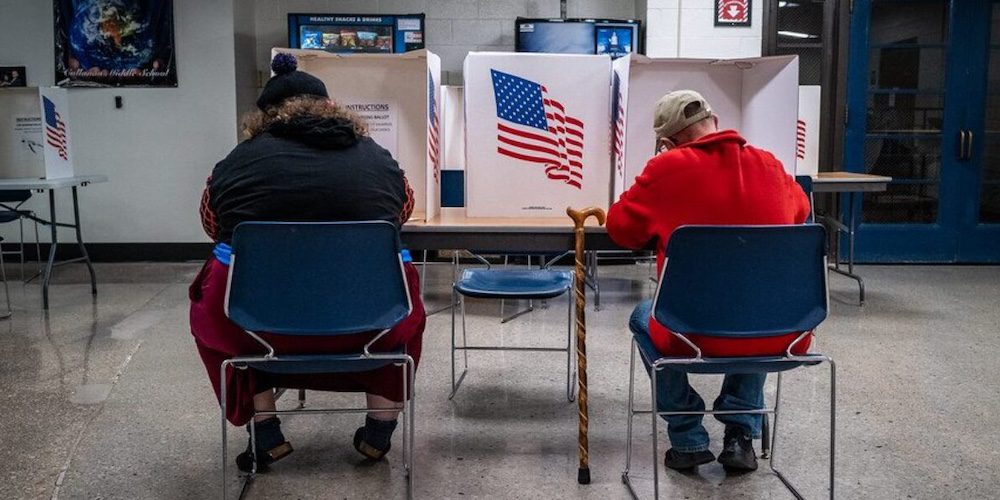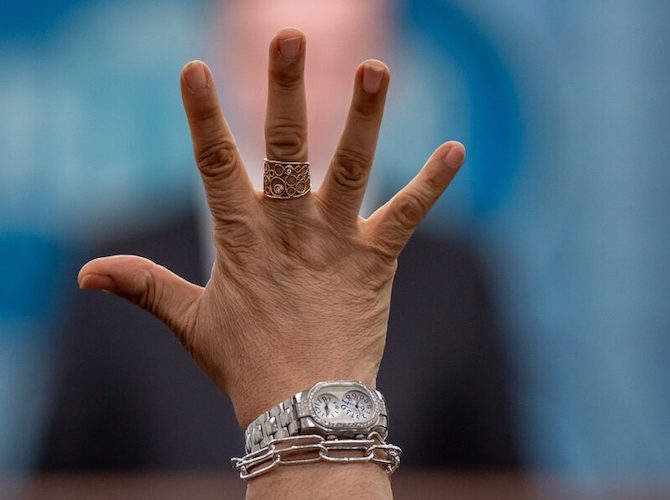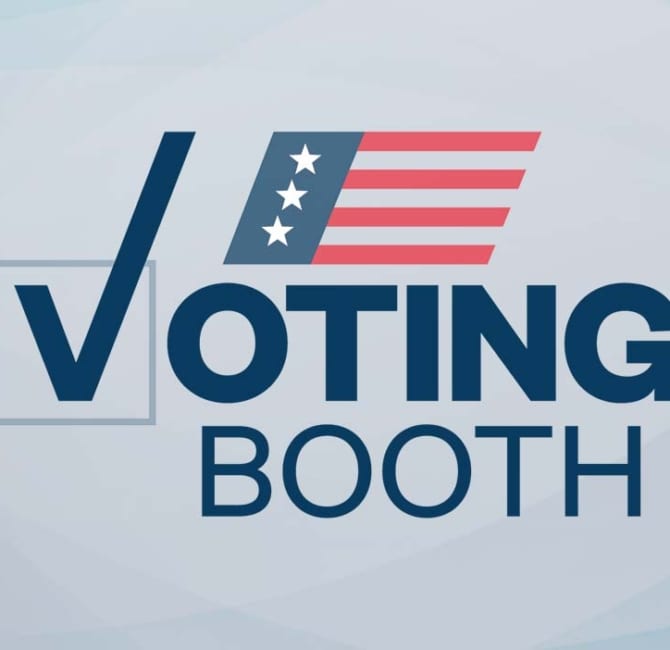MAGA Voting Barriers Not Making Much New Headway in Presidential Swing States

(Voters in Des Moines, IA on November 8, 2022. Photo credit: Phil Roeder / Flickr (CC BY 2.0 DEED)
In 2024’s presidential battleground states, the legal landscape is surprisingly shaping up in favor of Democrats and accommodating most voters who want to participate in November’s general election, despite a handful of regressive new laws and lawsuits by Republicans.
This more-positive-than-not assessment is based on reviewing every newly adopted state election law in 2023 and 2024, which, with a few exceptions, will make voting easier and more accessible in 2024’s battleground states. It is also based on reviewing the fate of nearly 50 voting-restricting lawsuits filed by Republicans since 2022’s elections.
Indeed, the election machinery in nearly all the battleground states is controlled by Democrats. While pro-Trump Republicans passed a rash of restrictive laws soon after the 2020 election and failed insurrection, those laws did not stop MAGA statewide candidates from losing in 2022’s midterm elections in Arizona, Nevada, Georgia, Michigan and Pennsylvania. Despite all the bombast, a “red-wave” did not materialize.
Two years later, the laws and rules governing voting in those states have mostly held firm. Of course, there are some exceptions that could pose problems in November, especially if those states’ margins are razor-thin. There are a handful of ongoing lawsuits whose potential impact, under the most draconian scenarios, could interfere with or obstruct several thousand voters. But that impact, which is speculative, does not come anywhere close to 2020’s presidential margins in those states – despite some shrill recent press coverage.
For example, Arizona’s requirement that newly registered voters provide proof of citizenship is in limbo – which could discourage new registrants. On August 1, a federal appeals court blocked the law that had disenfranchised hundreds of voters in the state’s most populous county during July. Republicans say that they will appeal to the US Supreme Court. (For reference, Joe Biden beat Donald Trump by 10,457 votes statewide in 2020 – a narrow but still vastly larger margin.)
More potentially impactful is Pennsylvania litigation over counting mail ballots where the return envelopes are improperly dated, which has led to more than 10,000 ballots being disqualified since the 2022 election in numerous local contests, according to voting rights attorneys. (Trump lost that state by 80,555 votes in 2020; another benchmark that’s much bigger.)
Similarly, a new Georgia law allows mass voter registration challenges. Since 2020, Trump loyalists have challenged tens of thousands of voters at a time. Those challenges, which were vetted by officials working overtime, almost entirely failed. The most recent wave of challenges have begun to be rejected. (Trump lost Georgia by 11,788 votes in 2020).
Still, red-run Georgia is the exception among the battleground states. The latest challenges, coupled with GOP legislators empowering county boards to potentially delay certifying winners, could trigger battles on Election Day and during the canvass that impacts the final count.
Ironically, the most restrictive voting environments are in red states. In 2023 and 2024, Republicans restricted voter registration drives (Florida, Idaho), imposed stricter voter ID requirements (Idaho, Indiana, Montana, Ohio, Oklahoma), expanded paperwork and other restrictions surrounding mailed-out ballots (Mississippi, Alabama, Arkansas, Louisiana, South Dakota), and set up special police to go after illegal voting (Florida, Arkansas and Texas).
While the next congressional majorities may come down to contests in those states (and while that control may, in certain scenarios, play a role in the election of the president), these states will are not be directly decisive when it comes to the Electoral College and presidency.
The big picture in 2024’s presidential swing states – despite the seasonal uptick in doom-and-gloom coverage and pledges by the Republican National Committee to aggressively litigate, especially surrounding post-Election Day rules – remains surprisingly favorable for Democrats and Americans who favor inclusive voting rights.
Pro-Democracy Presidential Landscape
This more positive-than-not assessment is based on several benchmarks. The first is looking at all of the new state legislation adopted in the past two years. The second is looking at litigation and court rulings in this same time period, which is where the partisans who have failed at lawmaking go to keep pressing for incremental advantages.
The foremost reason there are so few new anti-voter laws and rules in the presidential battleground states (Arizona, Georgia, Michigan, Nevada, Pennsylvania, Wisconsin) is that all of these states – except for Georgia – have Democratic governors who have vetoed regressive legislation. Additionally, these states have senior election officials (including Republicans) who favor inclusive elections – and have weathered years of attacks by Trump loyalists. Those election defense efforts include litigating in response to GOP lawsuits.
Anyone who doubts this assessment can review the 2023 and 2024 compilations of newly adopted election laws from the National Conference of State Legislatures (NCSL). NCSL is a genuinely non-partisan research organization and does not lobby, litigate, fundraise, or propagandize on election issues. That status is very rare in today’s political culture.
If one parses NCSL’s compendium, one will see few new restrictions on voting with mailed-out ballots in the battleground states. (Most of the efforts to restrict this balloting option – which 46 percent of 2020’s general election voters used in response to the COVID-19 pandemic – have been via GOP lawsuits that mostly have failed, according to this case-by-case listing.)
The same pattern holds true with early in-person voting before Election Day. There are no substantive new restrictions. Except for Arizona’s new proof-of-citizenship law, no swing state has new voter registration or ID requirements. (Voter ID requirements do exist in all of the battleground states. Most were passed during Barack Obama’s presidency.)
The closest recent Republican victory on this front arguably is preserving the requirement in Wisconsin that a witness fill out a form that must be submitted when a voter returns a mail ballot. That step complicates the process somewhat. However, it did not stop 426,000 Wisconsin voters in 2022, according to federal data. (Of those mailed-out ballots, only 4,000 were disqualified due to various errors with filling out the return envelope.)
For the most part, voter registration, voting by mail, early in-person voting, and ID requirements will be the same in 2024’s general election as they were in 2022’s midterms. Continuity from cycle to cycle encourages voters.
And even Arizona has new laws that would help new or recently relocating voters. Anyone whose registration file has been altered must be alerted by email or text within 24 hours – meaning that anyone intending to vote can be sure their information is accurate. Arizona also expanded early voting hours on the Friday before Election Day.
Those small inclusive steps should not obscure strident efforts by Arizona’s pro-Trump GOP to tilt other voting rules in their favor by going to court. Since 2022, they have sued to overturn all or part of the state’s election procedures manual, to decertify past results, to block drop boxes for mail ballots, and to claim Arizona’s voter rolls are error-ridden. But most of these suits have lost or are pending, which increasingly makes them moot for November’s election.
This is especially true when it comes to challenging voter rolls – which the Republican National Committee and its allies have done in the other presidential swing states. GOP activists may make a lot of noise about illegal voters, but a 1993 federal law bars removing voters 90 days before an election. That deadline fell on August 7 for 2024’s November 5 election.
Additionally, courts are very hesitant to change voting rules in the final weeks before ballots are printed, mailed in September to the military and citizens abroad, and voting begins. Essentially, the clock has run out on these suits.
A Different Example
Michigan has seen a similar swath of Republican litigation – essentially echoing similar dubious claims. But on the legislative front, following the passage of two state constitutional amendments in 2018 and 2022, Democrat-run Michigan has passed numerous new laws and adopted many rules to make voting more accessible, inclusive, and safe. Arguably, the state is the nation’s current leading model for pro-democracy reform.
The NCSL compendium notes that Michigan has formalized voting with mailed-out ballots by instituting online applications, ballot tracking, creating a permanent absentee voter list, and requiring one drop box for every 15,000 voters (in Georgia, it is one box per 100,000 voters). Michigan also formalized early in-person voting, criminalized threats to election officials, clarified the process of certifying winners, and restored registrations of felons who have completed a prison term.
Needless to say, Michigan Republicans, like their Arizona brethren, have filed multiple lawsuits to stop these inclusive efforts. But, as in Arizona, most of their suits have lost or are not likely to be resolved before November. And in rare instances where Republicans have won, such as on restoring stricter signature matching protocols for vetting mail ballot return envelopes, those victories are not likely to disenfranchise enough voters to sway 2024’s presidential results.
In 2020, Joe Biden beat Donald Trump by 155,000 votes. In 2022’s cycle, 24,000 mail ballots in Michigan were rejected, according to federal data, which estimates that one-fourth were rejected due to a “non-matching or incomplete” signature. What may have a larger impact in Michigan is whether the state’s large Arab-American community, which strongly supported Biden in 2020, turns out. Biden’s support of Israel’s war on Hamas in Gaza has greatly upset this voting bloc.
In other battleground states, there are some new laws that impede narrow slices of the process that have previously made voting easier. In Arizona, for example, only family members and caregivers now can return mailed-out ballots for people with disabilities, including infirm seniors. Previously, third-party groups assisted with that effort – which Republicans attacked as “ballot harvesting.”
Finally, it is noteworthy that Michigan, Nevada, and Wisconsin offer same-day voter registration, which helps first-time or last-minute voters to register and cast a ballot that counts.
Post-2022 Litigation
The most extreme attempted interventions have come as lawsuits from Trump loyalists. Many are little more than conspiratorial talking points repackaged as lawsuits – serving to perpetuate false and propagandistic claims. Indeed, most of these lawsuits have failed or are not likely to be resolved before November’s election.
This assessment is based on reviewing 250 lawsuits filed since 2022’s midterms. (These are listed 10-to-a-page on this website compiled by Marc Elias, one of the Democrats’ top election lawyers.) One-fifth of the suits concern the battleground states.
Many of the suits were built on “stop-the-steal” rhetoric that lingered after Trump’s loss. This is especially true in Pennsylvania, which arguably is 2024’s most pivotal presidential battleground.
There are a handful of lawsuits that keep litigating 2020’s election results that are not going to be changed – as their winners now hold office. There are other suits that echo other states and basically harass officials who do thankless jobs – such as culling voter lists of registrants who recently moved or died. And there are November-centered lawsuits that take aim at the most prevalent new voting trend, which is the public’s wide embrace of using mailed-out ballots, when they are given that option.
Trump and his loyalists contend that mail-based voting unduly helped Biden after that option was expanded by officials in response to 2020’s COVID-19 pandemic. However, that partisan belief is false. Academics have found the 2020 voting bloc that saw the greatest increase in turnout via using mailed-out ballots were rural Republicans: Trump’s base.
Nonetheless, GOP lawsuits in Pennsylvania have targeted this process in petty and more consequential ways. One suit forced one county to redesign its ballot return envelope by replacing “20_ _” in the dating section with a voter filling in the entire year. Another GOP suit has challenged registering members of the military if their applications do not include sufficient identifying documents.
More significantly, Republican legislators have sued to block every county from deploying drop boxes for mailed-out ballots. They want voters to return the ballots to local precincts, which may undercut their use. (In 2022’s general election, 1.2 million Pennsylvanians, or 23 percent of its electorate, voted by mail, according to federal data). The case is ongoing.
As in Arizona, Pennsylvania Republicans don’t want third-party groups helping older or more infirm voters to return mailed-out ballots this fall. However, in April, a state court refused to block such assistance for the state’s primary election. The case is ongoing.
These suits are not likely to succeed for several reasons. Pennsylvania’s state constitution has strong voting rights protections. Moreover, Republicans previously failed to overturn Act 77, the state’s 2019 law that expanded voting by mail. Another recent lawsuit that revived GOP claims against Act 77 lost in court. On August 1, Republicans withdrew their appeal of that ruling.
The lawsuit that, if successful, might disenfranchise the largest number of voters concerns accepting or rejecting mail ballots if the voter has improperly dated the return envelope. Since 2022, pro-voter attorneys have said that more than 10,000 mail ballots have been disqualified across Pennsylvania for this reason. A court hearing was held on Aug. 1.
The Big Picture
With three months to go before 2024’s Election Day, the legal landscape for voters in the presidential battleground states is surprisingly favorable. That may not stop Trump and his loyalists from attacking the process in the media and, should he lose, from attacking the election results in court, and in the press, and, most worrisomely, in the streets. But any contestation of the swing state results will first begin in the same state courts that overwhelmingly have rejected GOP litigation since 2022.
Lest this all seem too comforting, given the high stakes and high temperature of what many observers regard as an existential election, it should be noted that I have restricted this analysis to legislative and litigious efforts to shrink the electorate. That leaves administrative and extralegal hi-jinx for another day.
An example of the former would be a county providing targeted precincts with insufficient, old, or faulty equipment. Especially where ballot marking devices (BMD) are employed, having too few BMDs in a precinct or having them break down can cause bottlenecks and hours-long lines that serve to disenfranchise voters who cannot stay on line. Examples of the latter, the extralegal, would be targeted disinformation (e.g., telling voting-restored felons that they can’t vote or could be arrested for voting) or aggressive “poll-watchers” challenging and intimidating would-be voters and/or election officials.
These kinds of interference are hardly unprecedented in our history but their effects tend to be very difficult to quantify. As a consequence, their impact on election results can be both significantly underestimated and significantly overestimated.
So while In short, the legal landscapes in 2024’s presidential battleground states are shaping up to favor Democrats more than Republicans, this serves as no guarantee of a free and fair election impervious to interference.






